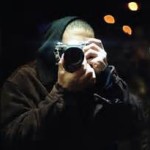FPP Harlem spoke with filmmaker and photographer Khalik Allah about his connection to his subjects and the way their participation in his art has affected them. Khalik will screen his documentary film, Field Niggas and Antonyms of Beauty, at this Tuesday’s FPP reading at Shrine! Chris Boeckmann, documentary film curator, describes the film like this: “Set entirely at night, Field Niggas takes us to the corner of 125th Street and Lexington Avenue in Harlem and introduces us to its faces. Not just avoiding but repudiating condescension, Khalik Allah’s camera, a longtime, welcome presence in the neighborhood, spotlights his subjects in stunningly composed, dignified portraits that are hypnotically woven with street images. The non-synch audio track consists of conversations with and among those faces: dreams, regrets, arguments, affection, observations, opinions. Field Niggas is a mesmerizing viewing experience, that finds its rhythm using field hollers. The title draws from Malcolm X’s ‘Message to the Grass Roots’ speech, in which he targets the power balance that creates a dangerous wedge between the ‘house slaves’ and the ‘field slaves’.” Khalik Allah’s singular, trenchant film serves as an ardent call to rise above social constructs.”
 How did you gravitate toward photography and documentary film as your medium?
How did you gravitate toward photography and documentary film as your medium?
All of my impressions came through the sense of vision. I was always a visual learner. I grew up in ’90s New York, so I have seen many gritty things that impressed me. I knew there was a way to depict all of this through film and because of that, at age 14 I started messing with cameras.
What responses have you gotten to Field Niggas and Antonyms of Beauty that have surprised you, made you reconsider something, or deepened your own sense of the work?
People are deep. People come up to me and give me a pound and say the work is inspirational and that it touched them. All the responses that people have vocalized to me have been positive. There are spiritual implications in my film that people hooked into, and I’m glad for that. The title of the film is always something that needs to be explained but besides that I feel the film is very direct. I’m inspired to make more films that explore deeper elements of our collective soul.
I read that some of the subjects of the film came to a screening of it at UnionDocs. What was that like for them and for you?
That was deep. To have my brothers from the hood with me, in an art venue – I was like “woah, this is real!” Many of my heads in the street don’t see how far I’ve taken the art, so it’s good for them to see it. Also it’s an inspiration to them and a way out.
I imagine that one of the difficulties of street photography and documentary is negotiating the line between work that feels humanistic or empathetic and work that feels exploitative. Can you talk about how you address that question in your own work or the work of other artists?
It all has to do with one’s heart. You’re gonna find out what’s in your heart by if you survive or not. To do what I do you have to be righteous, otherwise how will people be sincere and open up to you. I stay in the streets. I’m of the environment I depict. I’m offering a dignified perspective to what’s avoided and overlooked. My agenda is God oriented and somehow people can see this and feel my intentions are good.
You’ve spoken before about how immersive your art is—how you feel part of the neighborhood where you photograph and film (125th St and Lexington in Harlem) and part of your subjects’ lives. What kinds of relationships have arisen with the people that you photograph and film?
My relationship with Frenchie was deep. He was a 53 year old Haitian bipolar/schizophrenic who I became close friends with. He’s the most featured subject in my photography. We spent a lot of time together. I even went to look for him when he was in the psychiatric unit of Harlem Hospital on 135th St.
Certain souls you have a history with beyond this planet. Frenchie is one of those souls I met while out shooting in the middle of the night in Harlem.
When you go to a film festival, what kind of work are you hoping to see?
Other inspiring films that’ll help me understand and see what the people are thinking. I’m really into ideas and I like to see work people are creating that’s well thought out and honest to the heart.
What project are you working on now?
I’m working towards my first book of photographs and my next feature length documentary film. I’m screening at a lot of festivals, national and international. I have plans to continue with the same momentum I have now. I’m only getting started.
